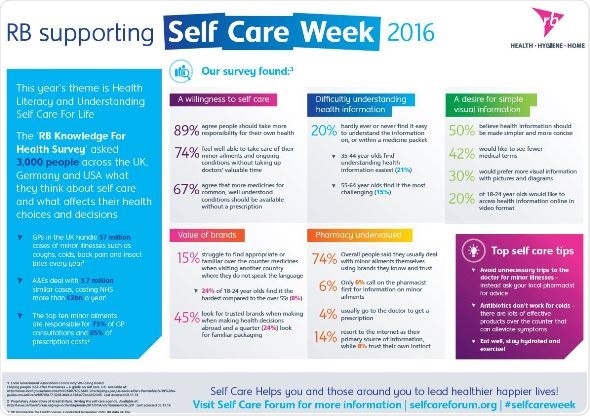Nov 15 2016
RB, the world’s leading consumer health and hygiene company, is supporting Self Care Week, a UK national initiative which seeks to support communities, families and generations to look after their own health better. Health Literacy, which is the focus for this year’s campaign, represents a major barrier to self care with some research suggesting that health information is too complex for 60% of adults in England to understand. With the health service under increasing pressure, improving understanding and encouraging positive behaviour change through self care, could enhance the ability of people to manage their own minor illnesses and reduce needless costs to society, health systems, individuals and companies.

The ‘RB Knowledge for Health Survey’ which garnered opinions from 3,000 members of the general public from UK, Germany and USA, revealed a willingness to self care. 89% agree that people should take more responsibility for their own health and two thirds (67%) agree that more medicines for common, well understood conditions should be made available over-the-counter (OTC) without a prescription.
Self care is defined as a lifelong habit for patients and the public dealing appropriately, effectively and safely with their own minor ailments and long term conditions, taking preventative measures to stay fit, and maintaining good physical and mental health and wellbeing. However many still rely on GPs for minor ailments. In the UK GPs handle 57 million cases of minor conditions and illnesses, such as coughs, colds, back pain and insect bites every year, while A&Es deal with 3.7 million similar cases, costing the NHS more than £2bn a year. The top ten minor ailments are responsible for 75% of GP consultations and 85% of prescription costs. Another study in 2012 found that every dollar spent in the US on
OTC drugs led to health-system savings of between six and seven dollars. In Europe it estimated that the total annual savings from the shift of care to self-medication by 5% would exceed €16 billion.
The RB survey also revealed that some find it harder than others to understand basic health information with 20% of respondents admitting they hardly ever or never find it easy to understand the information on or inside a medicine packet. When asked what could be done to make health information easier to understand:
- Half (50%) said they would like to see information made simpler and more concise
- 42% would like to see fewer medical terms
- 30% would prefer more visual information with pictures and diagrams particularly in the 18-24-year-old age group (39%), compared with the over 65s (24%).
- 18-24 year olds would like to access health information online in video format (20%) but the preference for this format decreased in older respondents down to 7% in over 65s
- Interestingly 28% would like to see the format of health information standardised across brands and products to make it easier for people to understand
Rakesh Kapoor, CEO, RB said:
We continually strive to provide consumer health innovations that enable people to self care and improving health literacy is a critical part of the puzzle. We need better recognition and awareness of the vital role of self care and the associated wide ranging public health benefits.
Effective self care depends, in part, on people being able to identify the correct medicine and this can be a particular challenge when abroad. Fifteen percent of people struggle to find appropriate or familiar OTC medicines when visiting another country where they do not speak the language. 5% find it impossible. The youngest age group of 18-24 year olds find it the hardest with 24% compared to the over 55s (8%). In this situation the majority of people (45%) said they look for a trusted brand name when making health decisions abroad, and a quarter (24%) look for familiar packaging.
Zephanie Jordan, Vice President, Global Regulatory Affairs, RB said:
This illustrates the importance of consistent branding for non-prescription medicines across countries, which is often not possible due to fragmented and sometimes illogical health regulation which hampers access for consumers. We also find that very commonly used, safe medicines are not readily available to people because the regulatory requirements for self care vary significantly from one country to the next. This unharmonised approach denies many consumers the ability to access medicines that are suitable for self care.
The critical role of the pharmacy and the pharmacist in effective self care is often overlooked by individuals. While the survey found that overall people usually deal with minor ailments themselves using brands they know and trust (74%), only 6% call on the pharmacist first for information on minor ailments.
RB is committed to promoting self care which helps empower individuals and communities to lead healthier, happier lives. In July 2016 a report entitled ‘Consumer health: time for a regulatory re-think?’ commissioned by RB and Proprietary Association of Great Britain (PAGB), written by the Economist